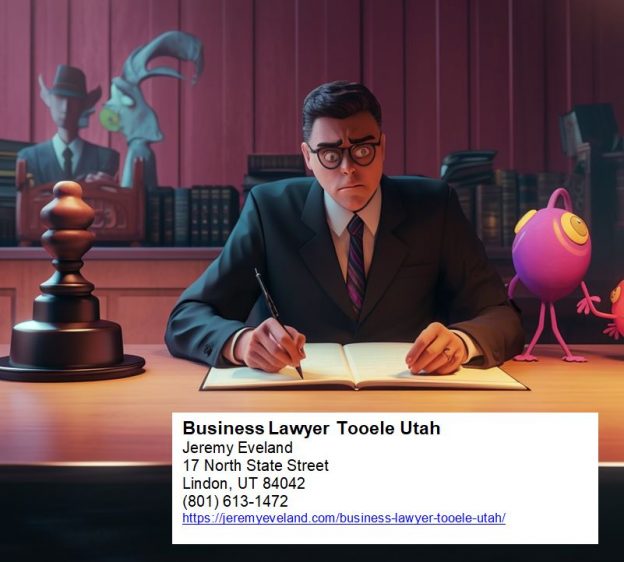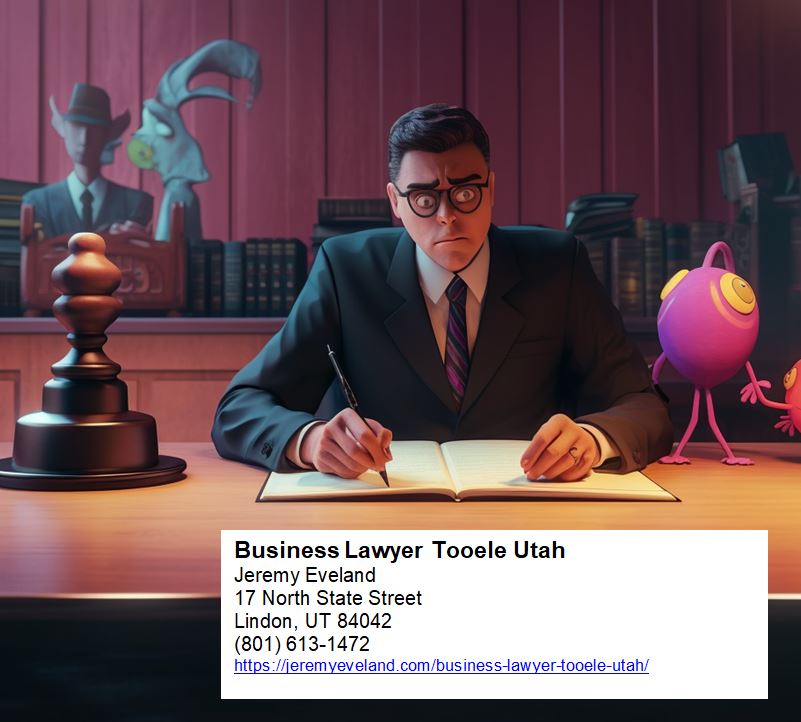Business Law is a complex and constantly evolving area of law that is essential for the success of any business. It covers a wide range of legal issues, including contracts, employment law, intellectual property, and liability, among others. Given the importance of these legal issues, businesses in Cottonwood Heights, Utah need to have a qualified and experienced business lawyer to provide legal advice, guidance, and representation.
A business lawyer in Cottonwood Heights, Utah is a professional who specializes in the legal aspects of running a business. They are trained to help business owners understand and comply with the laws and regulations that govern their operations. They also provide legal advice and representation on a variety of legal matters that businesses may encounter, including contract disputes, employment disputes, and intellectual property issues.
The roles and responsibilities of a business lawyer in Cottonwood Heights, Utah are numerous and varied. They are responsible for providing legal advice and guidance to businesses on a wide range of legal issues. This includes advising businesses on the proper legal structure for their operations, reviewing and drafting contracts, and representing businesses in legal disputes. They also help businesses comply with regulatory requirements and ensure that all necessary legal documents and filings are filed correctly and promptly. In addition, business lawyers in Tooele, Utah play a critical role in advising businesses on mergers, acquisitions, and partnerships, helping to ensure that these transactions are completed in a legally sound and effective manner.
To be an effective business lawyer in Cottonwood Heights, Utah, a person must possess several key qualifications and skills. Firstly, they must have a strong legal education and training, typically having earned a law degree and passed the bar exam. Secondly, they must have substantial experience in the practice of business law, which includes understanding the legal issues that businesses face and how to address them. Additionally, they must have excellent communication and negotiation skills, as they will often be called upon to interact with clients, opposing counsel, and government agencies. Furthermore, they must have the ability to manage complex legal matters, including conducting legal research, preparing legal documents, and negotiating settlements. Finally, they must have a thorough knowledge of local and federal laws that govern business operations in Cottonwood Heights, Utah.
Many types of businesses can benefit from the services of a business lawyer in Cottonwood Heights, Utah. Small businesses, startups, corporations, non-profit organizations, and limited liability companies (LLCs) are among the many types of businesses that can benefit from the expertise of a business lawyer. These businesses face a wide range of legal issues and challenges, and a business lawyer can provide valuable guidance and representation to help them navigate these challenges and achieve success.
To hire a business lawyer in Cottonwood Heights, Utah, it is important to take the time to research potential candidates. This may involve asking for referrals and recommendations from other business owners and conducting online research to identify lawyers with the necessary qualifications and experience. Once you have identified a list of potential candidates, it is important to review their credentials and experience to determine which lawyer is best suited to meet your legal needs. You should also schedule a consultation to discuss your legal needs and to determine whether the lawyer is a good fit for your business. Finally, it is important to choose a lawyer who meets your legal needs, budget, and communication style.
In conclusion, a business lawyer in Cottonwood Heights, Utah is an essential resource for businesses of all sizes and types. They provide legal advice and representation on a wide range of legal issues and help businesses comply with regulatory requirements and avoid legal disputes. With the right qualifications, experience, and skills, a business lawyer can help businesses in Tooele, Utah achieve success and growth.
Role and Responsibilities of a Business Lawyer in Cottonwood Heights, Utah
The role and responsibilities of a business lawyer in Tooele, Utah can vary depending on the size and type of business they are representing. However, generally speaking, business lawyers in Cottonwood Heights, Utah play a crucial role in providing legal advice and representation on a wide range of legal issues that businesses may face. Some of the key responsibilities of a business lawyer in Cottonwood Heights, Utah include:
Legal Advice and Guidance: Business lawyers in Cottonwood Heights, Utah provide legal advice and guidance to their clients on a wide range of legal issues, including contracts, employment law, intellectual property, and liability, among others. They help businesses understand the laws and regulations that govern their operations and advise them on the best course of action to take.
Contract Drafting and Review: Business lawyers in Cottonwood Heights, Utah are responsible for reviewing and drafting contracts for their clients. This includes employment contracts, supplier contracts, and customer contracts, among others. They ensure that these contracts are legally binding and protect the interests of their clients.
Representation in Legal Disputes: Business lawyers in Cottonwood Heights, Utah represent their clients in legal disputes, including contract disputes, employment disputes, and intellectual property disputes, among others. They provide their clients with the legal representation they need to achieve a favorable outcome in these disputes.
Legal Compliance and Regulatory Issues: Business lawyers in Cottonwood Heights, Utah help their clients comply with the various laws and regulations that govern their operations. This includes advising on tax laws, employment laws, and environmental laws, among others. They help their clients avoid legal disputes and penalties by ensuring that they comply with the law.
Mergers, Acquisitions, and Partnerships: Business lawyers in Cottonwood Heights, runs, Utah play a critical role in advising businesses on mergers, acquisitions, and partnerships. They help their clients navigate the complex legal issues associated with these transactions, including due diligence, negotiation, and drafting of legal agreements, among others.
In summary, the role and responsibilities of a business lawyer in Cottonwood Heights, Utah are diverse and encompass a wide range of legal issues. They play a crucial role in advising businesses on the law and providing representation in legal disputes, helping their clients achieve success and growth.
Qualifications and Skills of a Business Lawyer in Cottonwood Heights, Utah
To be a successful business lawyer in Cottonwood Heights, Utah, one must possess a specific set of qualifications and skills. Some of the key qualifications and skills of a business lawyer in Kearns, Utah include:
Legal Education: Business lawyers in Cottonwood Heights, Utah must have a Juris Doctor (J.D.) degree from an accredited law school and be licensed to practice law in the state of Utah. This requires completing a rigorous legal education that covers a wide range of legal topics and subjects.
Business Acumen: Business lawyers in Cottonwood Heights, Utah must have a strong understanding of business and commerce, including finance, economics, and accounting. They must have the ability to understand complex business issues and advise their clients on the best course of action to take.
Excellent Communication Skills: Business lawyers in Cottonwood Heights, Utah must have excellent written and verbal communication skills. They must be able to communicate complex legal concepts and ideas to their clients clearly and concisely, and e able to negotiate effectively on their client’s behalf.
Attention to Detail: Business lawyers in Cottonwood Heights, Utah must have a keen eye for detail and be able to review and analyze complex legal documents. They must be able to identify potential legal issues and take steps to address them before they become major problems.
Problem-Solving Skills: Business lawyers in Cottonwood Heights, Utah must have excellent problem-solving skills and be able to find creative solutions to complex legal problems. They must be able to think critically and analytically and find innovative ways to resolve disputes and achieve their client’s goals.
Ethical Conduct: Business lawyers in Cottonwood Heights, Utah must adhere to the highest ethical standards and be committed to providing their clients with honest and fair representation. They must be able to act with integrity and maintain their clients’ confidential information.
In conclusion, to be a successful business lawyer in Cottonwood Heights, Utah, one must possess a strong combination of legal education, business acumen, excellent communication skills, attention to detail, problem-solving skills, and ethical conduct. These qualities and skills are critical for providing effective legal representation to businesses and achieving positive outcomes for their clients.
Types of Businesses That Can Benefit from a Business Lawyer in Cottonwood Heights Utah
A variety of businesses in Cottonwood Heights, Utah can benefit from the services of a business lawyer. Some of the types of businesses that can benefit from the services of a business lawyer in Cottonwood Heights, Utah include:
Small Businesses: Small businesses in Cottonwood Heights, Utah often face a range of legal issues, including contract disputes, employment disputes, and liability issues, among others. A business lawyer can help small businesses navigate these legal issues and provide advice on the best course of action to take.
Startups: Startups in Cottonwood Heights, Utah face unique legal challenges, including intellectual property protection, venture capital financing, and employment law issues, among others. A business lawyer can help startups understand the legal issues they face and provide guidance on how to address these issues.
E-Commerce Businesses: E-commerce businesses in Cottonwood Heights, Utah face a range of legal issues, including data privacy, intellectual property, and consumer protection, among others. A business lawyer can help e-commerce businesses understand these legal issues and provide guidance on how to address them.
Real Estate Businesses: Real estate businesses in Cottonwood Heights, Utah face a range of legal issues, including contracts, zoning laws, and property disputes, among others. A business lawyer can help real estate businesses understand these legal issues and provide guidance on how to address them.
Manufacturing and Distribution Businesses: Manufacturing and distribution businesses in Cottonwood Heights, Utah face a range of legal issues, including contracts, liability, and intellectual property, among others. A business lawyer can help these businesses understand these legal issues and provide guidance on how to address them.
In fact, businesses of all sizes and types in Cottonwood Heights, Utah can benefit from the services of a business lawyer. Business lawyers in Cottonwood Heights, Utah can provide legal advice and representation on a wide range of legal issues, helping businesses navigate the complex legal landscape and achieve success and growth.
How to Hire a Business Lawyer in Cottonwood Heights Utah
Here are some steps you can follow to hire a business lawyer in Cottonwood Heights, Utah:
Identify Your Legal Needs: The first step in hiring a business lawyer in Tooele, Utah is to determine your legal needs. Consider the types of legal issues your business is facing, and identify the areas where you need legal assistance.
Research and Gather Referrals: Once you have identified your legal needs, research and gather referrals to find qualified business lawyers in Cottonwood Heights, Utah. You can ask for referrals from other businesses, use online directories or websites, or consult with the Utah State Bar Association.
Schedule Consultations: Schedule consultations with a few business lawyers in Cottonwood Heights, Utah. During the consultation, ask questions about their experience, qualifications, and fees, and assess their ability to meet your legal needs.
Check Credentials and References: Before hiring a business lawyer in Cottonwood Heights, Utah, check their credentials and references. Ensure that they are licensed to practice law in the state of Utah and that they have a good reputation and track record of success in representing businesses.
Review the Contract: Once you have selected a business lawyer in Cottonwood Heights, Utah, review the contract or engagement letter carefully. Ensure that the terms of the agreement are clear and that you understand the services the lawyer will provide and their fees.
In conclusion, hiring a business lawyer in Cottonwood Heights, Utah requires careful research and due diligence. By following these steps, you can find a qualified and experienced business lawyer who can provide effective legal representation and support your business’s success.
The services of a business lawyer are essential for businesses of all sizes and types in Cottonwood Heights, Utah. Business lawyers in Cottonwood Heights, Utah can provide legal advice and representation on a wide range of legal issues, helping businesses navigate the complex legal landscape and achieve success and growth. Hiring a business lawyer in Tooele, Utah requires careful research and due diligence, but by following the steps outlined, you can find a qualified and experienced business lawyer who can meet your legal needs and support your business’s success. Whether you are a small business owner, a startup, an e-commerce business, a real estate business, or a manufacturing or distribution business, a business lawyer in Tooele, Utah can provide valuable legal support and help you achieve your goals.
Areas We Serve
We serve individuals and businesses in the following locations:
Salt Lake City Utah
West Valley City Utah
Provo Utah
West Jordan Utah
Orem Utah
Sandy Utah
Ogden Utah
St. George Utah
Layton Utah
South Jordan Utah
Lehi Utah
Millcreek Utah
Taylorsville Utah
Logan Utah
Murray Utah
Draper Utah
Bountiful Utah
Riverton Utah
Herriman Utah
Spanish Fork Utah
Roy Utah
Pleasant Grove Utah
Kearns Utah
Tooele Utah
Cottonwood Heights Utah
Midvale Utah
Springville Utah
Eagle Mountain Utah
Cedar City Utah
Kaysville Utah
Clearfield Utah
Holladay Utah
American Fork Utah
Syracuse Utah
Saratoga Springs Utah
Magna Utah
Washington Utah
South Salt Lake Utah
Farmington Utah
Clinton Utah
North Salt Lake Utah
Payson Utah
North Ogden Utah
Brigham City Utah
Highland Utah
Centerville Utah
Hurricane Utah
South Ogden Utah
Heber Utah
West Haven Utah
Bluffdale Utah
Santaquin Utah
Smithfield Utah
Woods Cross Utah
Grantsville Utah
Lindon Utah
North Logan Utah
West Point Utah
Vernal Utah
Alpine Utah
Cedar Hills Utah
Pleasant View Utah
Mapleton Utah
Stansbury Par Utah
Washington Terrace Utah
Riverdale Utah
Hooper Utah
Tremonton Utah
Ivins Utah
Park City Utah
Price Utah
Hyrum Utah
Summit Park Utah
Salem Utah
Richfield Utah
Santa Clara Utah
Providence Utah
South Weber Utah
Vineyard Utah
Ephraim Utah
Roosevelt Utah
Farr West Utah
Plain City Utah
Nibley Utah
Enoch Utah
Harrisville Utah
Snyderville Utah
Fruit Heights Utah
Nephi Utah
White City Utah
West Bountiful Utah
Sunset Utah
Moab Utah
Midway Utah
Perry Utah
Kanab Utah
Hyde Park Utah
Silver Summit Utah
La Verkin Utah
Morgan Utah
Business Lawyer Cottonwood Heights Utah Consultation
When you need help from a Business Lawyer near Cottonwood Heights Utah call Jeremy D. Eveland, MBA, JD (801) 613-1472 for a consultation.
Jeremy Eveland
17 North State Street
Lindon UT 84042
(801) 613-1472
Related Posts
Impact of Environmental Regulations on Business Law Compliance
Business Lawyer South Jordan Utah
Business Lawyer Millcreek Utah
Business Lawyer Taylorsville Utah
How Artificial Intelligence is Shaping the Future of Business Law
Estate Planning is Crucial for People of All Income Levels
Navigating Legal Challenges in Business Succession Planning
Business Lawyer Bountiful Utah
How To Structure A Merger Or Acquisition In Utah
How To Hire Employees Legally in Utah
10 Tips for Negotiating Lease Agreements
Business Lawyer Spanish Fork Utah
How To Start A Non-Profit In Utah
What are the Trademark Laws in Utah
Business Lawyer Pleasant Grove Utah
How to Calculate Overtime Pay in Utah
Business Lawyer Cottonwood Heights Utah
[geocentric_weather id=”07e361c2-7a0d-49fa-90a7-0346ce59dbe6″]
[geocentric_about id=”07e361c2-7a0d-49fa-90a7-0346ce59dbe6″]
[geocentric_neighborhoods id=”07e361c2-7a0d-49fa-90a7-0346ce59dbe6″]
[geocentric_thingstodo id=”07e361c2-7a0d-49fa-90a7-0346ce59dbe6″]
[geocentric_busstops id=”07e361c2-7a0d-49fa-90a7-0346ce59dbe6″]
[geocentric_mapembed id=”07e361c2-7a0d-49fa-90a7-0346ce59dbe6″]
[geocentric_drivingdirections id=”07e361c2-7a0d-49fa-90a7-0346ce59dbe6″]
[geocentric_reviews id=”07e361c2-7a0d-49fa-90a7-0346ce59dbe6″]



















